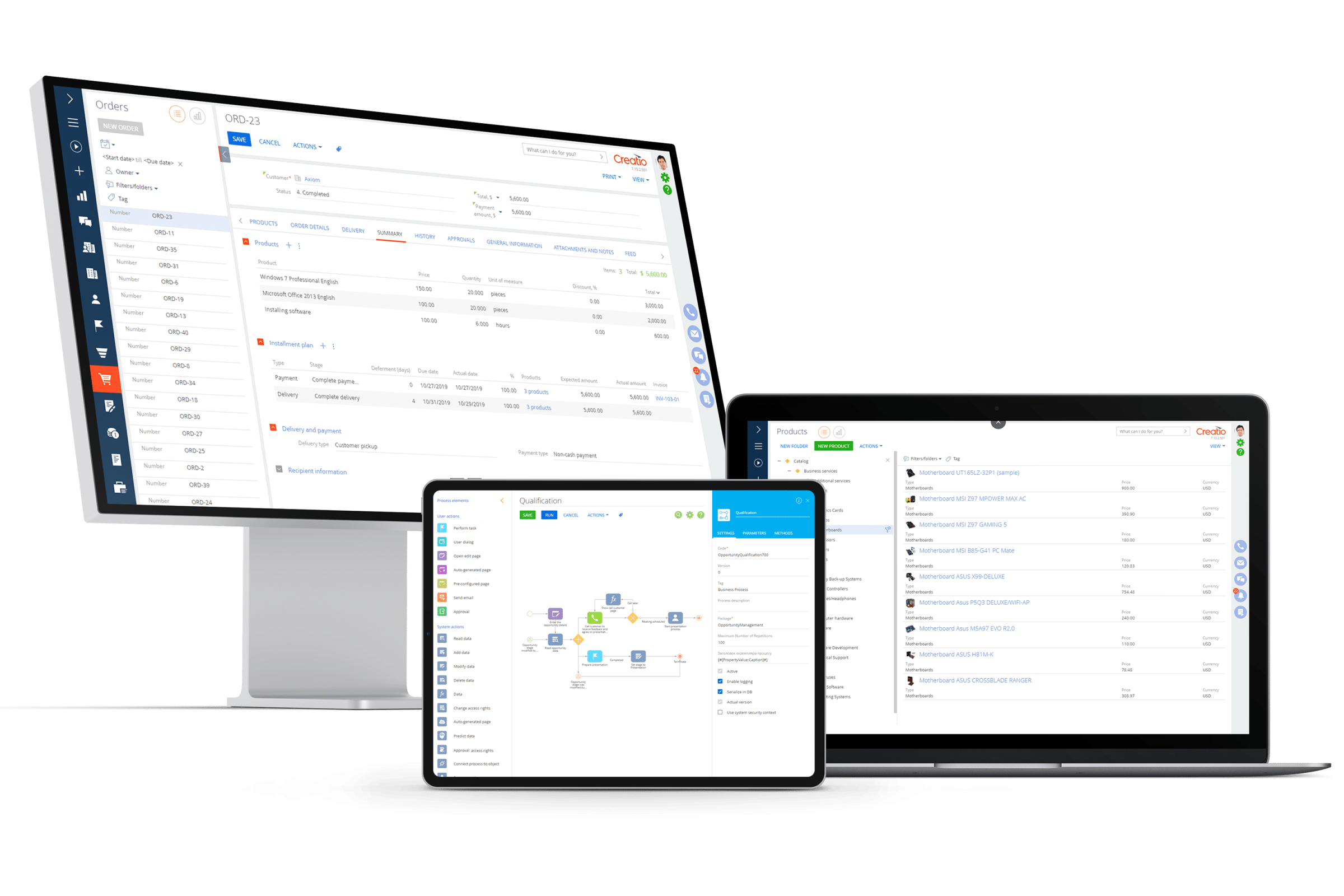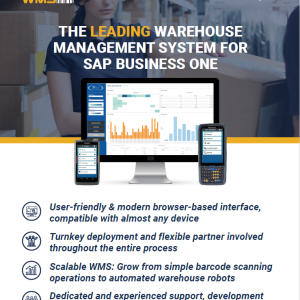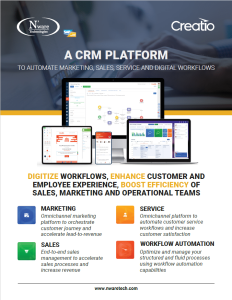ERP SOFTWARE FOR THE FORESTRY INDUSTRY
ERP Software for the Forestry Industry: Streamline Operations and Maximize Efficiency
Managing forestry operations involves a complex web of processes, from tracking forests and managing tree inventory to coordinating transport, supply chains, and sales. ERP software is a game-changing solution designed to address these unique challenges, offering real-time analytics, inventory insights, full product traceability, and advanced warehouse management tools.
Discover how SAP Business One can revolutionize inventory management, logistics, financial tracking, and more across the forestry industry, including the pulp and paper sector, solid wood product manufacturing, and recycled forest product manufacturing.
HOW ERP SOFTWARE SOLVES FORESTRY INDUSTRY CHALLENGES
Industry challenge
How SAP Business One helps
Inventory Management for Forests and Trees
Managing the lifecycle of timber—from standing trees to harvested logs and processed products—can be a daunting task without an integrated system to oversee the complexities involved. ERP (Enterprise Resource Planning) software offers a powerful solution by providing real-time analytics and forecasting capabilities.
- Monitor Resource Availability: Precise tracking of standing timber, harvested logs, and processed products. Maintain an up-to-date inventory of resources, ensuring that supply matches demand.
- Analyze Resource Condition: Monitor quality metrics, identify defects, and assess the suitability of materials, which is crucial for quality assurance and cost management.
- Enhance Supply Chain Management: End-to-end visibility, ensuring timely transportation of harvested logs and processed products.
Transport and Logistics Management
Efficient transport of logs, lumber, and processed materials is essential for ensuring timely delivery, minimizing costs, and maintaining high levels of customer satisfaction. In the timber and forestry industry, where operations often span remote locations and involve complex supply chains, delays and inefficiencies can have a significant impact on profitability and reputation.
- Route Optimization: Integrate GPS and logistics data to help businesses plan the most efficient delivery routes, minimizing travel time, reduces fuel costs, and ensures timely deliveries.
- Load Planning: Calculate the optimal configurations based on weight, size, and destination, ensuring safe, efficient transport and minimized costs.
- Compliance and Documentation: Automate the generation of transport permits, invoices, and compliance documents to reduce errors and ensure that businesses adhere to regulatory requirements.
Supply Chain Management
Managing a complex supply chain in the forestry sector requires seamless synchronization across multiple stages, including harvesting, production, distribution, and sales. Each phase is interdependent, and delays or inefficiencies at any point can ripple through the entire supply chain, impacting delivery timelines, escalating costs, and diminishing customer satisfaction.
- Demand Forecasting: Adjust production volumes and inventory levels proactively, ensuring you meet market needs without overproducing or underdelivering.
- Supplier and Partner Collaboration: Facilitate better communication and coordination with suppliers, contractors, and distribution partners with Centralized data sharing.
- Performance Monitoring/Analytics: Measure the efficiency of supply chain operations with detailed analytics and key performance indicators (KPIs).
Sales and Distribution of Lumber
Meeting customer demands and efficiently distributing lumber products in today’s fast-paced and unpredictable market requires a robust system capable of adapting to fluctuations and challenges. Whether addressing sudden surges in demand, managing inventory levels, or optimizing delivery routes, businesses need tools and processes that provide both flexibility and precision. Timely delivery is critical in the lumber industry, as delays can disrupt construction schedules and strain customer relationships.
- Pricing and Promotions Management: Ensure competitive pricing and protect profit margins by automating price adjustments based on factors such as demand, costs, and competition.
- Customer Relationship Management (CRM): Track customer interactions, preferences, and purchasing history to build stronger relationships and offer personalized services, increasing customer loyalty.
- Analytics/Reporting: Identify areas of improvement with detailed sales and distribution reports, offering insights into performance metrics such as order fulfillment rates, revenue trends, and customer satisfaction levels.
Financials and Accounting
Managing the financial health of a forestry business requires meticulous oversight of costs across multiple operations, including harvesting, transport, manufacturing, and sales. Each stage of the value chain presents unique challenges and significant expenditures that must be carefully monitored and optimized to ensure profitability and sustain long-term growth.
- Cost Tracking and Allocation: Track costs associated with harvesting, transportation, manufacturing, and sales to ensure that each stage of the value chain is evaluated for efficiency and cost-effectiveness.
- Profitability Analysis: Identify high-performing areas and address underperforming operations with insights into the profitability of specific products, projects, or business units.
- Regulatory Compliance and Reporting: Simplify compliance by generating accurate financial reports, tax filings, and audit trails, ensuring adherence to local and international standards.
WE HELP MANY AUTOMOTIVE AFTERMARKET COMPANIES WITH THEIR OPERATIONS

Supply Chain & Logistics for Electronics & Automotive
“Using SAP and LISA combined, we’ve definitely seen efficiencies in our warehousing and our whole logistics. We’re definitely faster and leaner; we can now grow and scale with the current infrastructure.”
– Chris Chance, Warehouse Operations Manager, Nemesis
“We now have complete visibility and control of the many data points required to service our customers. We have extended our cut-off time for orders, increased our business and strengthened our customer relationship, thanks to our new technology.”
– David Wilhite, President, Neotek Corporation

Manufacturing & Distribution of Automotive parts

Manufacturing of Automotive parts
“SAP Business One is a great tool. It brings the knowledge and structure of a large system to SMBs, so we can implement our policies and processes in the right way.”
– Andrew Failie, VP Operations and Admin, Trux Accessories
WE HELP MANY AUTOMOTIVE AFTERMARKET COMPANIES WITH THEIR OPERATIONS

Supply Chain & Logistics for Electronics & Automotive
“Using SAP and LISA combined, we’ve definitely seen efficiencies in our warehousing and our whole logistics. We’re definitely faster and leaner; we can now grow and scale with the current infrastructure.”
– Chris Chance, Warehouse Operations Manager, Nemesis

Manufacturing & Distribution of Automotive parts
“We now have complete visibility and control of the many data points required to service our customers. We have extended our cut-off time for orders, increased our business and strengthened our customer relationship, thanks to our new technology.”
– David Wilhite, President, Neotek Corporation

Manufacturing of Automotive parts
“SAP Business One is a great tool. It brings the knowledge and structure of a large system to SMBs, so we can implement our policies and processes in the right way.”
– Andrew Failie, VP Operations and Admin, Trux Accessories
ERP Solutions for Forestry Sub-Sectors
Pulp and Paper
Pulp and Paper
The pulp and paper industry faces several pain points, including fluctuating raw material costs, supply chain disruptions, and environmental sustainability challenges. High energy consumption, equipment maintenance, and waste management add to operational complexities. SAP Business One can help by providing:
- Inventory management: Track raw materials, pulp stocks, and finished paper products in real time.
- Supply chain optimization: Streamline the flow of materials from forests to mills and distribution centers.
- Financial tracking: Manage production costs, procurement expenses, and sales revenues effortlessly.
Solid Wood Product
Solid Wood Product
In solid wood product manufacturing, key pain points include inconsistent raw material supply, waste, and machinery downtime. Labor skill gaps and the need to comply with stringent environmental and safety regulations add complexity. SAP Business One can help by providing :
- Full product tracking & traceability: Follow logs through cutting, drying, and finishing processes.
- Warehouse management: Optimize the storage and retrieval of lumber products with WMS tools (LISA WMS).
- Sales management: Streamline orders and deliveries with real-time updates on product availability and customer needs.
Recycled Forest Product
Recycled Forest Product
Recycled forest product manufacturing faces challenges such as inconsistent material sourcing, processing inefficiencies, and regulatory compliance. Variability in product quality, rising recycling costs, and fluctuating market demand also impact profitability. ERP software is a critical tool for streamlining these operations :
- Inventory insights: Efficiently manage recycled raw materials and end products.
- Transport tracking: Coordinate shipments of recycled materials to and from processing facilities.
- Financials and accounting: Ensure profitability with accurate cost tracking and reporting.
ERP & Business Applications Built for the Forestry Industry
SAP Business One enhances profitability for forestry companies by streamlining operations, optimizing inventory, and improving production planning. Its integrated platform provides real-time insights into costs, facilitates better supply chain management, and enhances sales through improved CRM. Data-driven decision-making, reduced administrative burden, and increased customer satisfaction contribute to overall cost reduction and increased profitability.

ERP & Business Applications Built for the Forestry Industry

SAP Business One enhances profitability for forestry companies by streamlining operations, optimizing inventory, and improving production planning. Its integrated platform provides real-time insights into costs, facilitates better supply chain management, and enhances sales through improved CRM. Data-driven decision-making, reduced administrative burden, and increased customer satisfaction contribute to overall cost reduction and increased profitability.
ESSENTIAL FEATURES
Costs Analysis & Financials
An ERP’s built-in analytics tools track time and cost spends on different aspects of the production cycle. This data allows manufacturers to identify inefficiencies and implement measures to optimize spending and reduce overall production costs.

Material Repair and Overhaul
An ERP software maintains detailed records of repairs, tracks parts used, and logs the time taken for each task. This comprehensive oversight helps manage service timelines effectively and ensures equipment uptime.

Advanced Manufacturing
ERP platforms integrate seamlessly with advanced manufacturing technologies, such as CAD/CAM systems and IoT-enabled machinery. This connectivity allows for real-time data flow, enhancing productivity, precision, and quality control.

Quality Control
A critical aspect of industrial manufacturing is quality assurance. ERP solutions streamline the process by offering built-in quality management modules that track quality checks at various stages of production.

Warehouse Optimization
ERP systems help manufacturers proactively manage equipment maintenance schedules, preventing unexpected breakdowns and ensuring consistent operational efficiency. This predictive maintenance approach minimizes downtime and extends the lifecycle of machinery.

BOM version Control
An ERP system ensures that updates to BOMs are tracked accurately, maintaining version control to prevent costly errors in production. This functionality is particularly valuable when customizations or product variations are frequent.

Planning & Scheduling
ERP solutions facilitate advanced planning and scheduling capabilities, enabling manufacturers and distributors to manage capacity, allocate resources effectively, and plan production runs that align with demand forecasts. This reduces bottlenecks and improves workflow efficiency.

Machine & Apps Connectivity
The ability of ERP software to integrate with manufacturing machines, CAD, and truck scales allows for seamless data collection and monitoring. This capability supports predictive maintenance, real-time adjustments to production processes, and enhanced equipment efficiency.

RELATED DOWNLOADS
SAP BUSINESS ONE

LISA WMS

Creatio CRM



